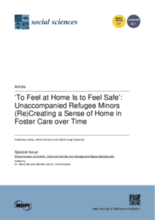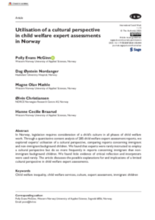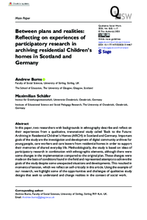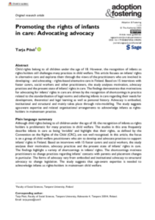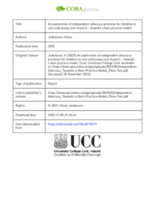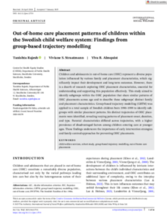

Displaying 51 - 60 of 1643
CoramBAAF is excited to publish the new Adoption Support Plan (ASP) England. The Adoption Support Plan and accompanying guidance for social workers, IROs and adopters has been developed by CoramBAAF building on work completed by Adoption England and feedback gained through a pilot of the form by 5 RAAs during 2024 and consultations with Adoption UK and relevant CoramBAAF forums. The form is compliant with relevant law, regulations and statutory guidance. It is designed to be used at key stages of the adoption process - during matching; when reviewing the placement prior to the adoption order being made and as a basis for future adoption assessments post order. It should be used alongside the Adoption Placement Report (APR) England 2025 which has been amended for this purpose.
This Norwegian study examines how unaccompanied refugee minors in foster care (re)create a sense of home over time, identifying security, familiarity, and autonomy as key intertwined aspects. It underscores the dynamic role of past experiences, present circumstances, and future aspirations, emphasizing the need for foster parents and child welfare workers to support cultural, relational, and personal continuity.
UK Foreign Secretary David Lammy launched a landmark global campaign to advocate for family-based care for all children across the globe. Lammy announced a Global Charter to work with governments around the world to progressively end the use of children’s institutions.
In Norway, legislation requires consideration of a child’s culture in all phases of child welfare work. Through a quantitative content analysis of 285 child welfare expert assessment reports, the authors explored experts’ utilisation of a cultural perspective, comparing reports concerning immigrant and non-immigrant background children.
Public service cuts and ‘stark impact of poverty’ are causing worse outcomes for children, according to survey
In this paper, two researchers with backgrounds in ethnography describe and reflect on their experiences from a qualitative, transnational study called 'Back to the Future: Archiving in Residential Children's Homes (ARCH) in Scotland and Germany. Important goals of the study are the investigation and development of digital community archives for young people, care workers and care leavers from residential homes in order to support their memories of shared everyday life.
Lack of adequate housing, welfare reforms and families lacking access to public funds adding to pressures on children's services in England, according to an Association of Directors of Children’s Services (ADCS) survey.
This article explores how infants’ rights in alternative care are understood and advocated for by practitioners in Finland, drawing on interviews with foster carers, social workers, and other professionals. The findings show that advocacy is driven by recognition of gaps in standardised practice and is enacted through embodied, institutional, and structural approaches, highlighting the need for age-aware expertise to fully recognise infants as rights holders in care.
This report, from Ireland, provides a comprehensive exploration of the principles and practice of independent advocacy for children and young people with care experience, with a view to signposting what constitutes best practice in this field and proposing a model of advocacy practice which reflects the key themes arising. Resulting from a research project carried out with EPIC (Empowering People in Care), the report draws from the views of those who have experienced advocacy as children and young adults, those who have provided advocacy as professional independent advocates, management personnel responsible for the provision of those services in the context of EPIC and significant stakeholders in the field of advocacy service provision.
Using group-based trajectory modelling on Swedish children born 1990–1999, this study identified six distinct patterns of out-of-home care placements that varied in onset, duration, and type. Findings show greater parental disadvantage among children entering care earlier, highlighting the need for early intervention and family-centred prevention strategies.

